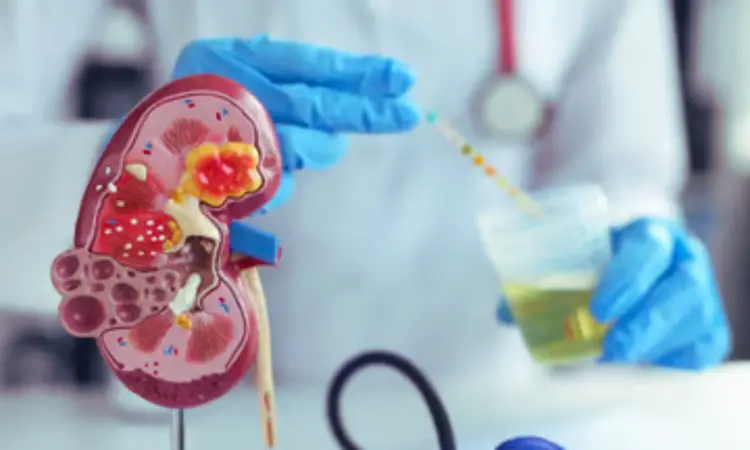- Home
- Medical news & Guidelines
- Anesthesiology
- Cardiology and CTVS
- Critical Care
- Dentistry
- Dermatology
- Diabetes and Endocrinology
- ENT
- Gastroenterology
- Medicine
- Nephrology
- Neurology
- Obstretics-Gynaecology
- Oncology
- Ophthalmology
- Orthopaedics
- Pediatrics-Neonatology
- Psychiatry
- Pulmonology
- Radiology
- Surgery
- Urology
- Laboratory Medicine
- Diet
- Nursing
- Paramedical
- Physiotherapy
- Health news
- Fact Check
- Bone Health Fact Check
- Brain Health Fact Check
- Cancer Related Fact Check
- Child Care Fact Check
- Dental and oral health fact check
- Diabetes and metabolic health fact check
- Diet and Nutrition Fact Check
- Eye and ENT Care Fact Check
- Fitness fact check
- Gut health fact check
- Heart health fact check
- Kidney health fact check
- Medical education fact check
- Men's health fact check
- Respiratory fact check
- Skin and hair care fact check
- Vaccine and Immunization fact check
- Women's health fact check
- AYUSH
- State News
- Andaman and Nicobar Islands
- Andhra Pradesh
- Arunachal Pradesh
- Assam
- Bihar
- Chandigarh
- Chattisgarh
- Dadra and Nagar Haveli
- Daman and Diu
- Delhi
- Goa
- Gujarat
- Haryana
- Himachal Pradesh
- Jammu & Kashmir
- Jharkhand
- Karnataka
- Kerala
- Ladakh
- Lakshadweep
- Madhya Pradesh
- Maharashtra
- Manipur
- Meghalaya
- Mizoram
- Nagaland
- Odisha
- Puducherry
- Punjab
- Rajasthan
- Sikkim
- Tamil Nadu
- Telangana
- Tripura
- Uttar Pradesh
- Uttrakhand
- West Bengal
- Medical Education
- Industry
Atrasentan Enhances Insulin Sensitivity in Type 2 Diabetes Patients with Chronic Kidney Disease: Study Reveals

Netherlands: A recent study, published in Diabetes, Obesity and Metabolism has revealed that atrasentan, an endothelin receptor antagonist, significantly improves insulin sensitivity in patients with type 2 diabetes (T2D) and chronic kidney disease (CKD). The findings, which focus on how this drug affects various phenotypic clusters of patients, highlight its potential as a valuable treatment option for those struggling with both conditions.
Patients with type 2 diabetes who exhibit a clinical phenotype marked by high insulin resistance are at a greater risk of developing chronic kidney disease. Previous research has shown that the endothelin receptor antagonist (ERA) atrasentan can reduce insulin resistance in T2D patients. In the study, Hiddo J. L. Heerspink, Department of Clinical Pharmacy and Pharmacology, University Medical Center Groningen, University of Groningen, Groningen, The Netherlands, and colleagues evaluated how atrasentan affects insulin resistance in different phenotypic clusters of T2D patients, providing insight into its potential benefits for various patient profiles.
For this purpose, the researchers conducted a post hoc analysis of the SONAR trial, a randomized, placebo-controlled study evaluating the effects of the endothelin receptor antagonist atrasentan in patients with type 2 diabetes and chronic kidney disease.
Patients in the trial were categorized into four previously identified phenotypic clusters: severe insulin-deficient diabetes (SIDD), severe insulin-resistant diabetes (SIRD), mild obesity-related diabetes (MOD), and mild age-related diabetes (MARD). The researchers then compared changes in insulin resistance, as measured by the HOMA-IR index, across these phenotypic clusters using a mixed-effects model.
The key findings of the study were as follows:
- Total Participants: The analysis included 931 patients in total.
- Overall Effect: In the overall population, atrasentan reduced HOMA-IR (a measure of insulin resistance) by 12.9% compared to placebo.
- Pronounced Effect in Insulin-Resistant/Deficient Clusters:
- SIRD cluster (severe insulin-resistant diabetes): Atrasentan reduced HOMA-IR by 26.2%.
- SIDD cluster (severe insulin-deficient diabetes): Atrasentan reduced HOMA-IR by 18.5%, though this effect did not reach statistical significance.
- Less Pronounced Effect in Other Clusters:
- MARD cluster (mild age-related diabetes): Atrasentan reduced HOMA-IR by 12.2%.
- MOD cluster (mild obesity-related diabetes): Atrasentan reduced HOMA-IR by −5.3%.
The study found that atrasentan, an endothelin receptor antagonist (ERA), significantly improved insulin sensitivity in T2D patients with CKD, particularly in those with a high degree of insulin resistance (SIRD cluster).
An important limitation of the study, as noted by the authors, is that only a subset of SONAR trial participants were eligible for this analysis. The findings are primarily based on insulin-naive T2D patients at high risk of CKD progression, meaning the results may not be applied to the broader population of T2D patients.
"Therefore, a more extensive analysis involving a larger cohort of patients is needed to determine whether the improvement in insulin sensitivity associated with atrasentan is predictive of its kidney-protective effects," they concluded.
Reference:
Smeijer JD, Gomez MF, Rossing P, Heerspink HJL. The effect of the endothelin receptor antagonist atrasentan on insulin resistance in phenotypic clusters of patients with type 2 diabetes and chronic kidney disease. Diabetes Obes Metab. 2024 Nov 6. doi: 10.1111/dom.16041. Epub ahead of print. PMID: 39503150.
Dr Kamal Kant Kohli-MBBS, DTCD- a chest specialist with more than 30 years of practice and a flair for writing clinical articles, Dr Kamal Kant Kohli joined Medical Dialogues as a Chief Editor of Medical News. Besides writing articles, as an editor, he proofreads and verifies all the medical content published on Medical Dialogues including those coming from journals, studies,medical conferences,guidelines etc. Email: drkohli@medicaldialogues.in. Contact no. 011-43720751


